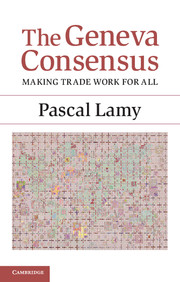Book contents
- Frontmatter
- Contents
- Preface
- 1 Harnessing globalization amid the crisis facing multilateralism
- 2 The changing face of trade
- 3 Helping the poorest up the prosperity ladder
- 4 Trade: friend not foe of the environment
- 5 Trading towards global food security
- 6 Trade can contribute towards better health
- 7 Trade and labour: separated at birth, but still connected
- 8 Trade and energy: the case for a greater WTO role
- 9 Trade and currencies: trading community seeks greater currency stability
- 10 Trade and competition: fairer competition makes for fairer trade
- 11 Trade and human rights: a case of misplaced suspicion
- 12 Corruption: a cancer that trade transparency can help to treat
- 13 Last but not least: the Doha Round
- Epilogue
- Index
Epilogue
Published online by Cambridge University Press: 18 December 2013
- Frontmatter
- Contents
- Preface
- 1 Harnessing globalization amid the crisis facing multilateralism
- 2 The changing face of trade
- 3 Helping the poorest up the prosperity ladder
- 4 Trade: friend not foe of the environment
- 5 Trading towards global food security
- 6 Trade can contribute towards better health
- 7 Trade and labour: separated at birth, but still connected
- 8 Trade and energy: the case for a greater WTO role
- 9 Trade and currencies: trading community seeks greater currency stability
- 10 Trade and competition: fairer competition makes for fairer trade
- 11 Trade and human rights: a case of misplaced suspicion
- 12 Corruption: a cancer that trade transparency can help to treat
- 13 Last but not least: the Doha Round
- Epilogue
- Index
Summary
In July 2013, I bade farewell to the WTO’s General Council, the major decision-making body of the organization. It was an opportunity for me to look back at my eight years as Director-General and to look forward to the challenges that lie ahead for the multilateral trading system.
As I have already strongly asserted in this book, negotiating trade opening is not the only function of the WTO, but it is clearly one of its central functions.
Because the latest round of trade negotiations – the Doha Round – has not yet been concluded, some might be tempted to say that the organization is in crisis, that trade multilateralism does not function, that the WTO has become irrelevant. I believe the reality is much more complex.
To begin with, I do not think the debate is about the relevance of the WTO. It is about its credibility. This credibility stems from the capacity to deliver results. And achieving multilateral trade opening today is not an easy task.
Opening trade and crafting multilateral rules has been severely affected by the profound shifts in geopolitics and economics. The former two-speed model of a world divided between developed and developing countries no longer reflects today’s economic realities. We must find a new balance in a multidimensional membership if we are to achieve multilateral trade opening.
- Type
- Chapter
- Information
- The Geneva ConsensusMaking Trade Work for All, pp. 186 - 189Publisher: Cambridge University PressPrint publication year: 2013

